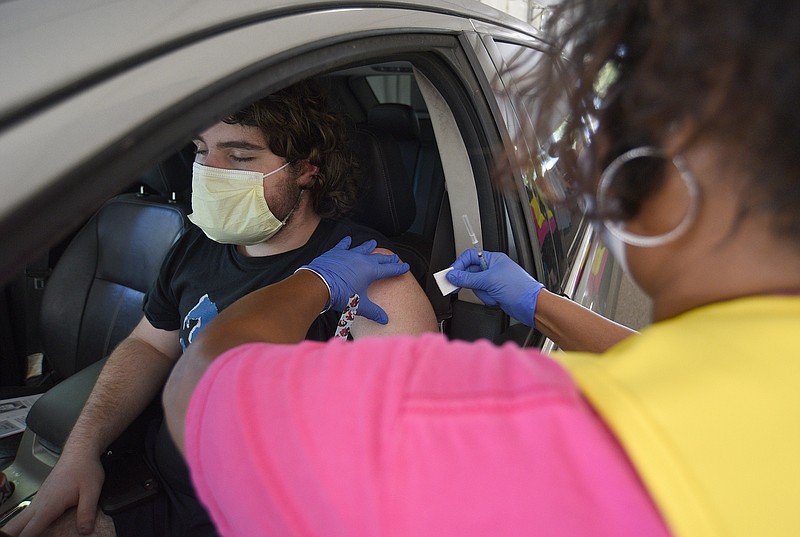National emergency declarations related to the pandemic are set to end May 11, meaning many patients in the Chattanooga region will likely have to start paying more for COVID-19 tests, treatments -- and in some cases -- vaccinations.
The White House announced Jan. 30 plans to end both the national emergency declaration, which was issued by former President Donald Trump in March 2020, and the public health emergency, which is declared by the Department of Health and Human Services secretary and has been in place since January 2020, on May 11.
The most noticeable, immediate change after May 11 will likely be in the cost of COVID-19 testing and availability of free testing options.
Health insurers will no longer be required to cover all costs associated with COVID-19 diagnostic testing at doctors' offices or hospitals or reimburse out-of-network test claims when the public health emergency ends. They also won't have to cover eight COVID-19 at-home tests per individual per month for free, although some insurers may voluntarily cover some tests.
People with traditional Medicare will no longer receive free, at-home tests starting May 11, but at-home tests for people on Medicaid will be still covered at no-cost through at least September 2024, according to a brief from the Kaiser Family Foundation.
(READ MORE: What eligible TennCare members need to do to stay covered in 2023)
Uninsured people in Tennessee have already been bearing the cost of testing since last year, and supplies of free tests from the federal government and at local organizations are dwindling.
Jill Fikkert, nursing director of LifeSpring Community Health -- one of the few Chattanooga-area providers continuing to offer free community COVID-19 testing -- said LifeSpring is still assessing the effect of the emergencies ending.
LifeSpring will likely scale testing back to one day per week until March, at which point the clinic will likely end all community testing, Fikkert said via phone Thursday. The provider will continue to offer free at-home tests while supplies last.
"That's probably something that we will see an end to -- the rapid tests and the at-home tests -- because we've been able to receive those for free up to this point," she said.
Most people with private insurance have faced out-of-pocket costs for COVID-19 treatments for some time now, but those on Medicare and Medicaid have not, according to the Kaiser Family Foundation. Medicare beneficiaries could face more costs after May 11, while people on Medicaid will keep receiving pharmaceutical treatments with no cost sharing through September 2024, KFF said.
The antiviral drug Paxlovid is still available for free to anyone as long as federal supplies last.
The federal supply of free COVID-19 vaccines is not tied to the public health emergency, but even once the free vaccines run out, the Affordable Care Act requires employer-sponsored and individual health plans to cover all recommended vaccinations at no cost, including COVID-19 vaccines.
But after the public health emergency ends, insured people will need to make sure COVID-19 vaccines are given at an in-network provider to avoid out-of-pocket costs.
Dalya Qualls White, a spokeswoman for BlueCross BlueShield of Tennessee, said via emailed statement that the insurer has workgroups across the company tasked with implementing the various changes that will take effect following the end of the national emergency and public health emergency.
"Specific changes and considerations vary according to plan type, and we'll refresh our BCBSTUpdates.com site with the latest information as it is confirmed," she said. "Most importantly, we'll continue to support our members' access to affordable COVID-19 prevention, treatment and testing as we move forward."
Fikkert said LifeSpring's community vaccinations efforts will probably wind down by the fall, at which time LifeSpring is looking into holding a fall vaccination clinic.
"Our goal is to pivot from a COVID response to a community response," she said. "It's kind of run its course, and I feel like we've been there, we've been available and we will again if the need arises."
Last week, the Hamilton County Health Department reported 402 new COVID-19 cases over a seven-day period, representing a 7% increase in cases over the prior week.
There were 42 COVID-19 patients in local hospitals as of Feb. 1, according to the Health Department. At least eight Hamilton County residents have died due to COVID-19 so far in 2023.
Contact Elizabeth Fite at efite@timesfreepress.com or 423-757-6673.
